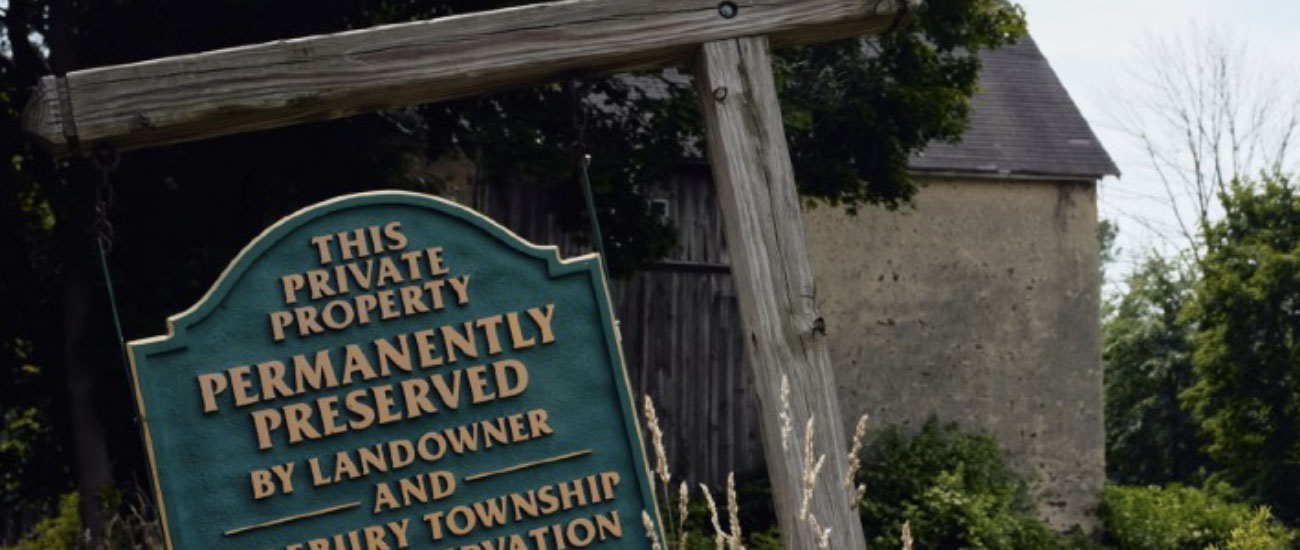Wait! I Thought That Farm Was Preserved

Every now and then—usually when land protected by a conservation or agricultural easement changes hands–the new owner begins to carry out new or different activities on the land and the neighbors are surprised and then angered by what they perceive as prohibited land uses taking place on a farm they thought was preserved.
Their reaction is certainly understandable, but it doesn’t answer the big question: “Are they allowed to do that?”
Agricultural preservation easements, conservation easements, restrictive covenants and the local zoning ordinance can all have a profound effect on what a property owner can do with his land. Other than the local zoning ordinance—which can be found on the township’s website or by talking to the elected officials or the zoning officer—a restriction on real estate must be written down and then the document is recorded at the Recorder of Deeds office, so the restriction is a publicly available document to be read by anyone. It is said to “run with the land,” and becomes a part of the title to the land, binding future owners “in perpetuity.”
Sometimes the new property owners themselves have not actually READ the document that restricts what activities can lawfully be carried out on the land. They are shocked to discover they can’t cut trees down here, or put up a fence or horse shed there. “I thought I just couldn’t subdivide it and develop it, and I’m NOT,” they say when someone complains. But that doesn’t answer the question, “Are they allowed to do that?” It all depends on (1) what the document actually says and (2) who has the power and the obligation to enforce the restriction.
Conservation easements sometimes allow certain activities on a portion of the land, and restrict it in other places. There might be a “standard protection area” that permits residential uses and even construction and a “highest protection area” which requires the land to be kept in its natural state. The original conservation easement might have been donated by the landowner to a conservancy or land trust and only the conservancy or land trust has the power to enforce its restrictions. The original landowner and the conservancy might have negotiated the terms of the conservation easement, but it is binding on subsequent owners. Land trusts inspect those properties at least once a year to make sure the new landowner adheres to the requirements of the conservation easement. They are empowered to enforce the restrictions if there’s a problem.
Agricultural easements are often drafted by the Pennsylvania Department of Agriculture to promote agricultural activities and are purchased from a farmer actively engaged in farming. The agricultural easement can be enforced by the County or the state, but is usually inspected annually by the county and enforced by the County. However, because it deals with a business—agriculture is an important part of Pennsylvania’s economy—if the current landowner is actively engaged in agricultural

activities, even activities that smell, exclude the public, or make noise, the complaint of activity might not violate the terms of the agricultural easement even if it’s not pleasant for its neighbors.
In places like Bucks County, operating a farm next to a residential subdivision can be a challenge for both the farmer and the neighbors. Residential neighbors might trespass or encroach on the farmer’s lands, or permit their children to come into contact with farm animals without supervision, and might honestly be surprised when activities like fertilization or harvesting smell or make noise or do both. The farmer who owns a farm preserved by an agricultural easement might not have any choice but to continue what he’s doing in order to keep the farm—preserved in perpetuity against being used as anything else—profitable.
There are situations, however, where owners of a preserved property are using it for activities that require a large piece of land but which are not normal agricultural activities, such as assembling road building materials or landscaping loads not produced on the farm and not intended to be used on the farm. It’s questionable whether these activities are “agriculture” or something else. If so, the County might bring an enforcement action to stop the activities that are not agricultural.
In suburban Philadelphia, some large landowners use their preserved lands for generating income from “agritainment,” or entertainment venues that utilize farm themes or holiday themes. This is generally a zoning issue if a conservation easement or agricultural preservation easement doesn’t apply.
Does the Township permit composting in the agricultural zone? Does it permit hayrides, pony rides, firewood sales, farm sales and even farm stores? Some do. Some don’t. The individual locally elected township supervisors make those kinds of decisions. If what the landowner is doing violates the zoning ordinance, then the Township can file a code enforcement action to stop it. It’s important to remember, however, that merely “running a business” on the farm or land is not enough by itself. If the zoning ordinance permits farming (and it must) then neighbors must understand that agriculture is, itself, a business.

PA has a Right to Farm or ACRE Law (Agriculture, Communities and Local Environment) that lets a farmer have a local ordinance restricting normal farming activities tested by the PA Attorney General who may sue to have the ordinance invalidated. The Attorney General can render an opinion that will help the local government bring its ordinances into line with the state law which generally does not allow restrictions on normal farming operations.
So, can the landowner do that? Well, it’s complicated. The recorded conservation easement deed, or agricultural preservation deed or zoning ordinance must be reviewed before the question can be answered. A landowner of preserved land must comply with ALL restrictions on his land— the zoning, the conservation or agricultural easement or a deed restriction and the landowner is not protected by the Right to Farm law if a previous owner accepted a conservation easement that is more restrictive than the local ordinances.
In the meantime, it’s good for our communities to have lands preserved for their environmental or agricultural values and conservancies such as the Land Trust of Bucks County who actively encourage open space preservation and help keep the lands they steward open.
Looking to navigate the intricate web of real estate and zoning regulations? The experts at Timoney Knox’s Real Estate and Zoning & Municipal Law divisions are here to guide you every step of the way. Reach out today!
Timoney Knox's Real Estate Litigation Group
Timoney Knox has real estate attorneys experienced in buying and selling property; in mortgaging and borrowing against real estate; in interpreting and applying the wide variety of local land use and zoning laws; and in representing the needs and concerns of individuals as well as homeowners’ associations, condominiums, and planned communities.






